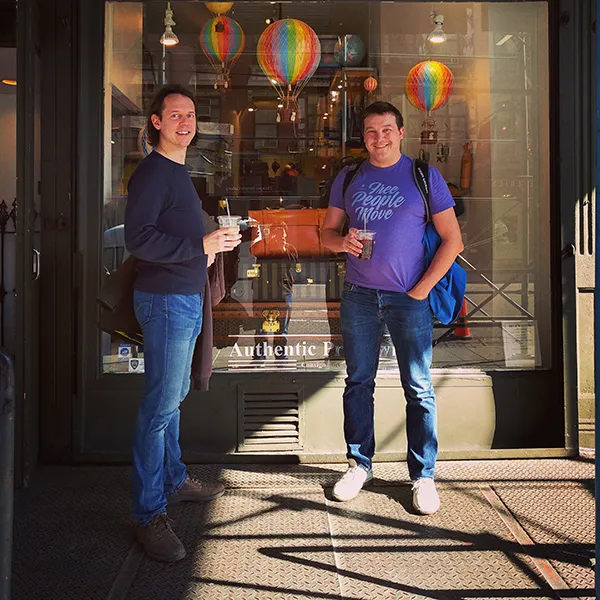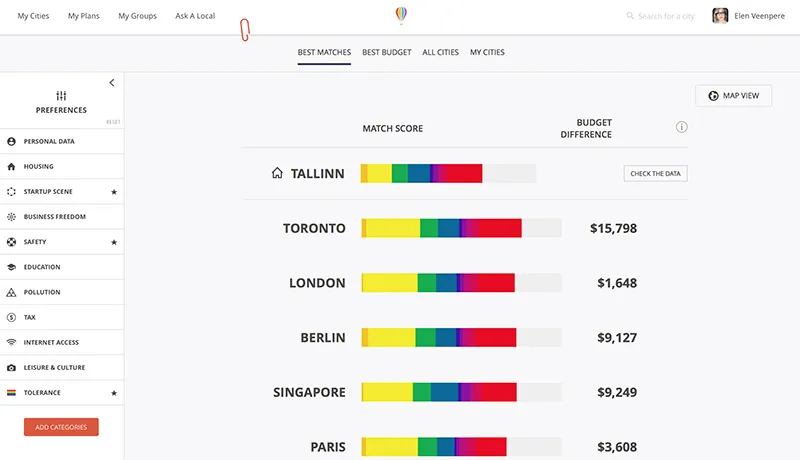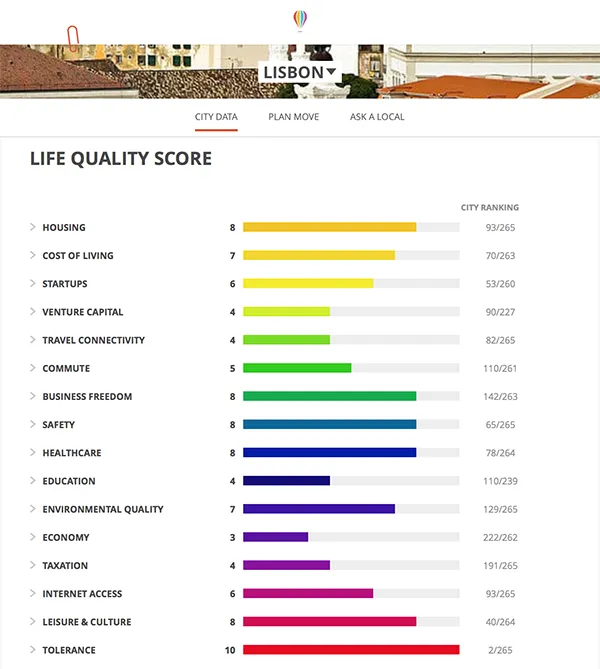Where Should You Live? This App Will Tell You
Enter your budget and a number of your preferences and Teleport will match you with some fitting cities
/https://tf-cmsv2-smithsonianmag-media.s3.amazonaws.com/filer/a8/73/a873e6b5-e7c3-4617-be8d-367ec29c4cae/melbourne-suburb.jpg)
If you’ve ever struggled to figure out where to live and work, you might benefit from Teleport, a website and app that recommends cities based on your lifestyle.
Trying the web browser version for myself, I prioritized places good for remote work and quality of life options including “tolerant society,” “near water” and “travel with ease.” (I skipped the cost of living questions; the past decade, I’ve lived in Copenhagen and San Francisco, two of the most expensive cities on the planet. I’m used to exorbitant expenses.) Under the city infrastructure options, I chose “car-free life” and ignored “school quality” and “less traffic” since neither really applies to my life. I was surprised when it suggested I move to Lisbon or Geneva, two walkable, cosmopolitan cities I’d never considered.
Teleport grew out of the founding team’s own experiences living in various cities around the world, often working remotely across cities and time zones in North America, Europe and Asia. The software company, which is constantly expanding its product line, began with Teleport Cities, a service that uses big data to determine where an individual should be based. (They are tight-lipped when it comes to specifics about the algorithm.) Since then, the group has developed tools, including Teleport Runway, which helps compare the costs of starting and running a small business in various locations, and Teleport Directory, a resource list for finding services and people in your next home city, as well as international moving checklists and blueprints for how to manage professional teams remotely.
Currently based in Palo Alto, Calif., Teleport co-founder and CEO Sten Tamkivi shares his story with Smithsonian.com.
Where did the idea for Teleport originate?
Teleport definitely grew out of personal pains. Between my two co-founders, Silver Keskküla and Balaji Srinivasan, and me, we had lived in a dozen countries already, and I personally had spent a large part of my career running teams spread between multiple cities. Most of our team knows the struggles of moving around all too well. [There are many aspects to] trying to stay informed about your next location and steps you need to take: the hours of research, 29 browser tabs open at a time, the lack of credible information and trying to remember everything that is important to you and whoever you're moving with.
Half of our team previously worked at Skype, which also plays a huge part in both what we are building as well as how we are doing it. Basically, if at Skype we were making the world a smaller place in metaphorical sense, at Teleport, we are getting to the next stage and moving people around physically. By the time we had 200 people, we already had 10 locations, so every week, there were some questions about where to hire the next people and where to open the next office.

What’s the elevator pitch?
Teleport moves people to their best place to live and work, based on their personal needs and preferences. We help you plan your life across the current and future cities you want to work and live in, and get in touch with the communities, employers and governments to make the next move.
What’s the user experience for Teleport Cities?
You tell us about yourself: choose the life quality aspects that are important to you, and also reveal a little bit about your financial situation, such as your area of work and monthly rent budget.
Based on this, Teleport Cities gives you a list of cities that match your preferences, including a breakdown of your match score (qualitative features of a city), and budget differences (the hard numbers) compared to your current city. If you’d like, you can change your info, or add or remove some life quality settings to get a more accurate match list.
Once you’re happy with your preferences, you can go ahead and explore your top cities. Our city profile pages contain a huge amount of interactive widgets that break down information about every quality of life aspect in that city that you could possibly imagine.
Data is nice, but local experience is also great. For any other questions, we have an Ask a Local community, easily accessible from each city profile, where you can ask locals about living in a particular city.

What is the geographic range? Is it limited to certain cities, with plans of expanding to others?
It's completely global. We kind of even ignore countries as a division on a map and think of cities or urban areas everywhere as our unit of management. We started out with the 100 most creative cities around the world, and have now reached 265. We add new cities based on user votes, both to avoid our own bias and to make sure our product is as versatile as possible.
A third of our users come from Europe, a third from North America and another third from everywhere else, mostly South America and Asia. We have a quarter of a million accounts signed up and executed over a million searches in 2016.
What types of preferences can a user select in a search?
There are about 300 different data dimensions involved in the product, but some of the most popular examples are cost of living, quality of education, tolerance towards minorities, environmental quality, cultural activities, job availability, labor regulations and economic growth.

What are the most popular of your location optimization tools?
Teleport Cities is definitely our most used product, and the one we spend the most time developing. While at it, though, we’ve kept running into adjacent pains that our users need a solution for, and especially some that have been really easy to build as light little apps based on the data and infrastructure we already have for our core product.
Some of our more popular side products include Teleport Zen, an interactive moving checklist; Teleport Sundial, a coordination tool for remote teams; and Teleport Runway, a tool to calculate your startup’s runway budget and compare costs in different locations.
Are there any misconceptions about your suite of products?
Some people have been slightly confused at the sheer amount of products we have built in a very short time. I’ve even been invited to speak at a product conference on the topic of immaturely large product portfolios. While the Teleport Cities life search is our core, we’ve just felt a number of small, targeted apps on the side have allowed us to learn and experiment without bloating our core product with random features.
Luckily, we have a great user base that is very active in giving us feedback and letting us know immediately when something is wrong or hard to understand, which is great, because we can fix the issue as well as learn a valuable lesson.
/https://tf-cmsv2-smithsonianmag-media.s3.amazonaws.com/accounts/headshot/brittany_headshot_crop.jpg)
/https://tf-cmsv2-smithsonianmag-media.s3.amazonaws.com/accounts/headshot/brittany_headshot_crop.jpg)